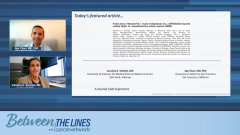
MonumenTAL-1 in Relapsed/Refractory MM: Overview of Study Design
Following a brief review of the relapsed/refractory multiple myeloma treatment landscape, Carolina Schinke, MD, provides an overview of the MonumenTAL-1 study design.
Episodes in this series

Transcript:
Ajai Chari, MD, PhD: Hi, welcome to Cancer Network’s “Between the Lines.” It’s my pleasure today to be with you. My name is Ajai Chari. I was previously at Mount Sinai, and as of August 1, I’ll be starting as director of myeloma at the University of California, San Francisco. I’ll let my outstanding colleague introduce herself as well.
Carolina D. Schinke, MD: Thank you very much. Hi. My name is Carolina Schinke. I’m here at the University of Arkansas for medical science at the Myeloma Center. I’m excited to have this opportunity to discuss the recent results of a novel bispecific treatment with Dr Chari.
Ajai Chari, MD, PhD: So, we know that myeloma is a relatively uncommon cancer compared to solid tumors, but it is the second most common blood cancer and is characterized typically by hypercalcemia, renal failure, anemia, and bone disease. In my 2 decades or so of doing myeloma, I remember when we just had steroids and conventional chemotherapy, and we’ve been fortunate in the last two decades to have 3 IMiDs [immunomodulatory drugs], 3 proteasome inhibitors, multiple immunologic agents, and XPO-1 inhibitors. I think what’s been particularly exciting is the management of heavily treated patients, who historically had a dismal prognosis of less than 6 to 9 months of overall survival. Now we have multiple of what we would classify as T-cell redirection therapies, which includes CAR Ts [chimeric antigen receptor T-cell therapies] and bispecifics.
We already have 1 commercially available bispecific known as teclistamab that targets BCMA [B-cell maturation antigen]. What’s exciting about these is that while CAR Ts are also very important, those slots have been relatively restricted ,and CAR Ts require going to a large academic medical center that’s typically…accredited and does transplants. I think we’re on the beginning of a new wave of treating all cancers because we now have bispecifics for ALL [acute lymphocytic leukemia], lymphoma, and myeloma, and community doctors are going to be wrestling with this topic in the very near future if they haven’t already. And we’re excited today to bring you some of the latest data for a bispecific known as talquetamab. I’ll turn it over to Dr Schinke to get the discussion started.
Carolina D. Schinke, MD: Thank you. I’ll be presenting the updates of MonumenTAL-1 and a very exciting study. Just wanted to say I totally agree with Dr Chari that it’s an exciting era where we have now new and novel treatment options available for our patients. And so MonumenTAL-1 was a phase 1 and 2 study evaluating the efficacy and safety of talquetamab in patients with relapsed/refractory multiple myeloma. So a lot of these patients as you can see here had already multiple lines of treatment, at least 3 prior lines of treatment. These patients have had exposure to at least 1 proteasome inhibitor, an immunomodulatory drug, CD38 monoclonal antibody. So overall, a very heavy, heavily pretreated patient population. Now, this study included 3 cohorts, and I think is really neat because it compared 2 dosing schedules. One was 0.4 mg/kg. That was the first cohort, cohort A, every week. So this drug was given weekly in this cohort. The second cohort was a little bit different 0.8 [mg/kg]. So twice the dose…but given every other week.
So obviously, it seemed a little bit more convenient to the patient. But it was just also needed for us to compare the efficacy and then safety data between these 2 cohorts. And then cohort C included patients who had prior T-cell-redirecting treatment. So those were patients who had either BCMA CAR T-cell treatment or BCMA-targeting bispecific antibody treatment. The end points evaluated were overall response rates, as well as secondary end points included duration of response, PFS, overall survival, and, of course, safety. The background of this trial is talquetamab is a first-in-class, off-the-shelf T-cell–redirecting bispecific antibody. So a very novel target, GPRC5D. In contrast to what is now available, teclistamab targets BCMA as well as the CAR T-cell [therapy] we have available. The ide-cel [idecabtagene vicleucel] targets BCMA. So this is a novel target.
The objective of this study or of this presentation at ASCO last week was to present the updated results. The baseline characteristics of the study and the three cohorts were similar in the three cohorts, except obviously for cohort C, where we had prior BCMA targeting treatment. Median age overall was in the 60s, a little bit older cohort in cohorts A and B, with 67 patients in cohort C that had prior exposure to T-cell redirecting treatment who were a bit younger, 61. But otherwise, overall, very similar cohorts in terms of prior lines of treatment. Median prior lines of treatment were 5 in cohorts A and B, and then a little bit more, 6, in cohort C. Triple-class refractoriness was high throughout all cohorts: 75% in cohort A, 70 in cohort B, 84 in cohort C. Then again cohort C, where patients that had prior T-cell–redirecting treatment, two-thirds of those had prior CAR T-cell therapy, and one-third had bispecific antibody treatment.
Transcript edited for clarity.
Newsletter
Stay up to date on recent advances in the multidisciplinary approach to cancer.







































